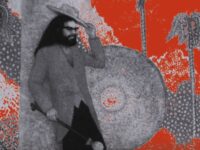Philip Seth Campbell’s City Lights album proves that the “ghost of Tom Joad” has enough divinity to spin into the eternal vinyl grooves that are still “born to run” with a votive candle backbeat and an always blessed rock ‘n’ roll sainthood soul.
My friend Kilda Defnut says, “This music sings at the foot of a sincerely secular cross and confesses perdition without any prayer for redemption.” All that said, Philip Seth Campbell was the lead singer for Scotland’s very excellent Temperance Movement, a band that resurrected the rock template of the ’70s, with Campbell’s gravel-voiced soulful delivery backed by (to quote Bad Company) “rock steady” bandmates who caught the wonderful spirit of bands like Free, Taste, Cactus, Mountain, Backstreet Crawler, and solo guys like Jess Roden or Frankie Miller.
Seeking the headwaters of all this ’70s rock vocalizing only leads to the eternal wellsprings of such musical saints as Sam Cooke, Ray Charles, Otis Redding, Jackie Wilson and Wilson Pickett. The great Van Morrison, no slouch on the odd soulful singles, just said: “Rave on John Donne,” whom he termed “a holy fool” who “left us infinity.” So, just check the “all of the above” to all the cited names, and enjoy that “infinity” that has been gifted in the grooves of so many sublime records.
The first song from City Lights, “Magical West,” ignites with a “Dancing in the Dark”-era Bruce Springsteen vibe. It’s pretty obvious, but it’s also brilliant rock music. Of course, the Rolling Stones once sang, “I know it’s only rock ‘n’ roll but I like it.” This album is a huge nod with a “whole lotta love” to a “whole lotta” classic rock stuff. The same is true for the anthemic “Hasta Luego.” The tune simply soars with the passion of an arena audience’s lighter petrol fire, rekindling any lost love of rock ‘n’ roll music.
In contrast, the music flares with soulful horns. “Revelation” oozes like a gospel prayer and conjures the deep beauty of (the great) John Hiatt circa “Have a Little Faith in Me.” Indeed, as Philip Seth Campbell sings, “love is free and is holy.” The tune confesses its pure soul. Then “All the Way Down” swirls (ironically) with wings of stringed delight. But “Break the Curse” slows the rumble with a piano-bible-thumped roadside church (with big choir!) hymn to that “sincerely secular” salvation that drinks from Big Muddy rock ‘n’ roll baptismal waters.
The title song grooves with funky horns and a vocal that rolls with the melodic tumble of a Memphis gambler’s big-time addictive dreams in which, as the (beloved) Band once sang, “life is a carnival” with “two bits a shot.”
Elsewhere, “Soul Fire” is just beautiful music. The song punches an immense time clock that bleeds with a worship for an always expectant weekend release with a beer, perhaps a dance, and a really great jukebox tune that makes Monday into a warm thought of a distant star.
Ditto for the urgent prayer of “Sober Boy” that genuflects in melodic confession and prays to some weird patron saint who just might, despite all the tough scrutiny of a canonization ritual (with miracles and all of that), still love a legitimate soul-drenched torched tune. Big strings introduce “Silent Symphony.” The song is a lovely mesh of pop music that glues a nice melody to a big jumbled thought in which “dice” sometimes “tumble.”
But then AC? DC? And, really, who cares as “Gut City Blues” buzzes with fizzing circuits, a scorched vocal, a fiery guitar pulse, and a show-stopping stomp that depletes oxygen and injects all the initial hydrogen (just before it morphed into all that helium!) that somehow still burns with Big Bang intensity into a final deep revival of the rooted rock ‘n’ roll grooves of this record.
- Coincidence – ‘Coincidence,’ ‘Clef de Ciel’ + ‘Archives 1973-1974’ (2024) - November 17, 2024
- Mile Marker Zero – ‘Coming of Age’ (2024) - October 14, 2024
- Burton Cummings – ‘A Few Good Moments’ (2024) - October 7, 2024




